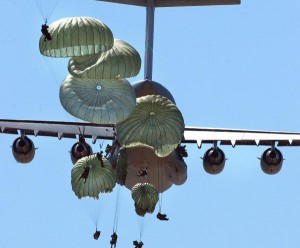Airborne School
 Earn your Wings – Become Part of an Elite Family
Earn your Wings – Become Part of an Elite Family
Becoming a paratrooper at Airborne School is a unique experience requiring special dedication and a desire to be challenged mentally and physically. This three-week course, also known as Basic Airborne Course, teaches Soldiers the techniques involved in parachuting from airplanes and landing safely. The final test includes a non-assisted jump.
The purpose of the BAC is to qualify the volunteer in the use of the parachute as a means of combat deployment and to develop leadership, self-confidence, and an aggressive spirit through mental and physical conditioning.
Airborne Soldiers have a long and distinguished tradition of being an elite body of fighting men and women – people who have always set the example for determination and courage. When you volunteer for this training, you accept the challenge of continuing this tradition. The Airborne Soldiers of the past set high standards – it is now up to you to maintain them!
Weekly Schedule
Ground Week
During Ground Week, Soldiers must pass the Army Physical Fitness Test (APFT). The Ground Week Airborne instruction begins with an intensive program of instruction to build individual Airborne skills. These skills prepare the Soldier to make a parachute jump and land safely. Students train on the mock door, the 34-foot tower and the lateral drift apparatus.
Tower Week
Tower Week completes the Soldier’s individual skill training and further builds team effort skills. To go forward to Jump Week, Soldiers must qualify on the Swing Lander Trainer (SLT), master the mass exit procedures from the 34-foot tower, gain canopy confidence and learn how to manipulate the parachute from the 250-foot tower, and pass all physical training requirements.
Jump Week
Successful completion of the previous weeks of training prepares Soldiers for Jump Week. During Jump Week, Soldiers must successfully complete five jumps at 1,250 feet from a C-130 or C-17 aircraft. Paratroopers who successfully meet course requirements are granted an additional skill identifier and are authorized to wear the coveted “Silver Wing” on their uniform.
Entrance Information
The purpose of the Basic Airborne Course (BAC) is to qualify individuals in the use of the parachute as a means of combat deployment and to develop leadership, self-confidence, and an aggressive spirit through mental and physical conditioning.
Airborne Soldiers have a long and distinguished tradition of being an elite body of fighting men and women — people who have always set the example for determination and courage. When you volunteer for this training, you accept the challenge of continuing this tradition. The highest standards have been set — it is now up to you to maintain them!
Requirements
- Qualified cadets
- Volunteer for the course
- Be less than 36 years of age on ATRRS report date
- Physically qualify for parachute duty IAW AR 40-501, Hearing Conservation Program Be prepared to pass the APFT with a score of 180 points (60 points per event) using the 17 to 21 year age-group scale as the standard, administered on day one of training.
- ROTC cadets must be under scholarship or contracted.
- Enlisted personnel must have completed Basic Combat Training, OSUT, or other service equivalent training
- Commanders selecting personnel to attend the BAC will refer to AR 614-110, Assignment of Airborne Officers and Processing Volunteers for Training and AR 614-200, Enlisted Assignments and Utilization Management for information on airborne volunteer selection and processing
